#sometimes less interesting headlines = more interesting stories
Explore tagged Tumblr posts
Text
i keep seeing screenrant articles and stuff (most recently) that are all "*gasp!* the toymaker has fixed continuity in doctor who by saying that actually it's all a mash up of different timelines!" and every time i'm just like yeah???? that isn't new that's literally the entire show
#el speaks#doctor who#dw 60th#google has long since figured out what I'm into#(apparently it's doctor who and archaeology and quantum mechanics in case you were wondering)#and i am occasionally a sucker for that specific kind of clickbait that's like#NEW STUDY SUGGESTS UNIVERSE MAY ACTUALLY BE TWICE AS OLD AS WE THOUGHT#where you can just take one look at the headline and go#nah#nah that's preeeeeeeetty obviously a massive exaggeration of conclusions made by a single preprint#maybe a chance that the authors would agree with the headline because they're going a little out there#but probably even they would say it's an exaggeration#the REAL exciting stem headlines are like#we found the first aperiodic monotile (it's shaped like a hat)#that's when you know you've found the good stuff#(the actual headlines about that were much less funny but I don't remember any examples because they weren't very interesting)#sometimes less interesting headlines = more interesting stories#but also sometimes i just want to read some dumb shit that's completely nonsensical but also 100% completely benign#because you know what? sometimes ya just gotta get way too into string theory and that's fine#fringe physics beliefs generally have utterly no impact on one's actual relationship to the world around them#and anyway how big can the overlap between people who care about this shit and people who believe this shit be?#wait what am i talking about now? i started out talking about doctor who#oh well#that's what the internet is for
2 notes
·
View notes
Note
Mr. Flanagan, I’d like to ask a question and I deeply hope that it does not offend or upset you. I am strongly considering canceling my Netflix subscription due to their new password sharing policy. However, Midnight Mass is one of my favorite shows of all time and I know it isn’t available on DVD, and I’m also profoundly anticipating your take on my favorite Edgar Allen Poe story. So I wanted to ask your take on people accessing your work through, uh, other means. If it’s something that’s offensive to you or will harm you or the other people who work so hard on these shows, I’ll happily keep my Netflix just so that I can keep supporting your work. I respect you far too much as an artist to do otherwise.
Again, I really hope I’m not upsetting you by asking this question. Thank you for everything, and I hope you’re having a great day!
(NOTE 6/4/2024: I'm editing this entry because, well over a year since it was posted, some journalists dug this up and used it to create click-bait headlines that are misleading, out of context and artificially combative. While I was of course disappointed over the years that Netflix opted not to release my work on physical media, I never experienced any hostility or aggression in those discussions, and I sincerely regret the manner in which this post was used in the press this week.)
Hi there - no offense taken whatsoever, in fact I think this is a very interesting and important question.
So. If you asked me this a few years ago, I would have said "I hate piracy and it is hurting creators, especially in the independent space." I used to get in Facebook arguments with fans early in my career when people would post about seeing my work on torrent sites, especially when that work was readily available for rent and purchase on VOD.
Back in 2014, my movie Before I Wake was pirated and leaked prior to any domestic release, and that was devastating to the project. It actually made it harder to find distribution for the film. By the time we were able to get distribution in the US, the film had already been so exposed online that the best we could hope for was a Netflix release. Netflix stepped in and saved that movie, and for that I will always be grateful to them.
However...
Working in streaming for the past few years has made me reconsider my position on piracy.
In the years I worked at Netflix, I tried very hard to get them to release my work on blu-ray and DVD.
It became clear very fast that their priority was subscriptions, and that they were not particularly interested in physical media releases of their originals, with a few exceptions.
While companies like Netflix pride themselves on being disruptors, and have proven that they can affect great change in the industry, they sometimes fail to see the difference between disruption and damage. So much that they can find themselves, intentionally or not, doing harm to the concept of film preservation.
The danger comes when a title is only available on one platform, and then - for whatever reason - is removed.
We have already seen this happen. And it is only going to happen more and more. Titles exclusively available on streaming services have essentially been erased from the world. If those titles existed on the marketplace on physical media, like HBO's Westworld, the loss is somewhat mitigated (though only somewhat.) But when titles do not exist elsewhere, they are potentially gone forever.
The list of titles that have been removed from streaming services is growing.
I still believe that where we put our dollars matters. Renting or buying a piece of work that you like is essential. It is casting a vote, encouraging studios - who only speak the language of money - to invest more effort into similar work. If we show up to support distinct, unique, exciting work, it encourages them to make more of it. It's as simple as that. If we don't show up, or if they can't hear our voice because we are casing our vote "silently" through torrent sites or other means - it makes it unlikely that they will take a chance to create that kind of work again.
Which is why I typically suggest that if you like a movie you've seen through - uh - other means, throw a few dollars at that title on a legitimate platform. Rent it. Purchase it. Support it.
But if some studios offer no avenue for that kind of support, and can (and will) remove content from their platform forever... frankly, I think that changes the rules.
Netflix will likely never release the work I created for them on physical media, though I'll always hold out hope.
Some of you may say "wait, aren't The Haunting of Hill House and The Haunting of Bly Manor available on blu-ray and DVD?" Yes, they are, because they were co-produced with Paramount, and I'm grateful that Paramount was able to release and protect those titles. (I'm also grateful that those releases include extended cuts, deleted scenes, and commentary tracks. There are a number of fantastic benefits to physical media releases.)
But a lot of the other work I did there are Netflix originals, without any other studio involvement. Those titles - like Midnight Mass, The Midnight Club, and the upcoming Fall of the House of Usher - along with my Netflix exclusive and/or original movies Before I Wake and Gerald's Game - have no such protections. The physical media releases of those titles are entirely at Netflix's discretion, and don't appear to be priority for the studio at this time.
At the moment, Netflix seems content to leave Before I Wake, Gerald's Game, Midnight Mass, and The Midnight Club on the service, where they still draw audiences. I don't think there is a plan to remove any of them anytime soon. But plans change, the industry changes.
The point is things change, and each of those titles - should they be removed from the service for any reason - are not available anywhere else. If that day comes - if Netflix's servers are destroyed, if a meteor hits the building, if they are bought out by a competitor and their library is liquidated - I don't know what the circumstances might be, I just know that if that day comes, some of the work that means the most to me in the world would be entirely erased.
Or, what if we aren't so catastrophic in our thinking? What if it the change isn't so total? What if Netflix simply bumps into an issue with the license they paid for music (like the Neil Diamond songs that play such a crucial role in Midnight Mass), and decide to leave the show up but replace the songs?
This has happened before as well - fans of Northern Exposure can get the show on DVD and blu-ray, but the music they heard when the series aired has been replaced due to the licensing issues. And the replacements - chosen for their low cost, not for creative reasons - are not improvements. What if the shows are just changed, and not by creatives, but by business affairs executives?
All to say that physical media is critically important. Having redundancy in the marketplace is critically important. The more platforms a piece of work is available on, the more likely it is to survive and grow its audience.
As for Netflix, I hope sincerely that their thinking on this issue evolves, and that they value the content they spend so much money creating enough to protect it for posterity. That's up to them, it's their studio, it's their rules. But I like to think they may see that light eventually, and realize that exclusivity in a certain window is very cool... but exclusivity in perpetuity could potentially limit the audience and endanger the work itself.
#midnight mass#haunting of hill house#the midnight club#the haunting of bly manor#physical media#streaming#piracy#torrent#film preservation
14K notes
·
View notes
Text
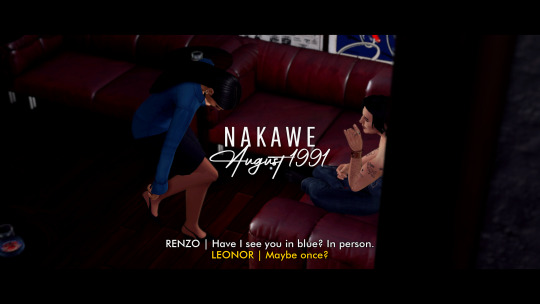


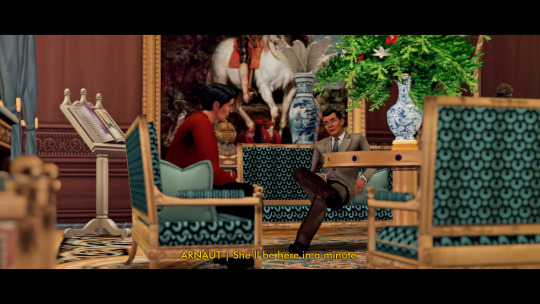

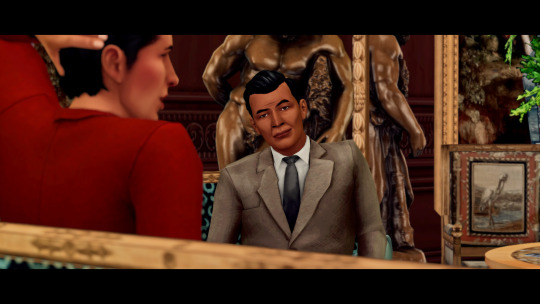
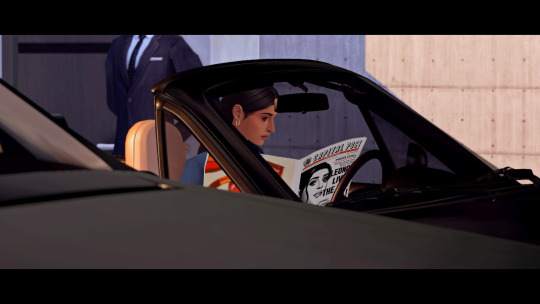
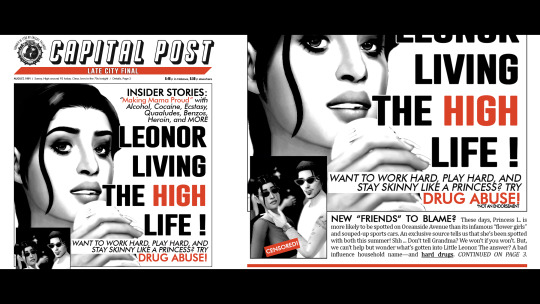
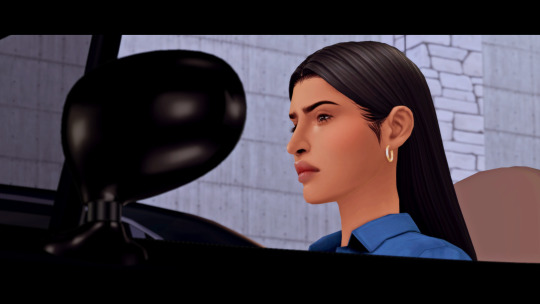
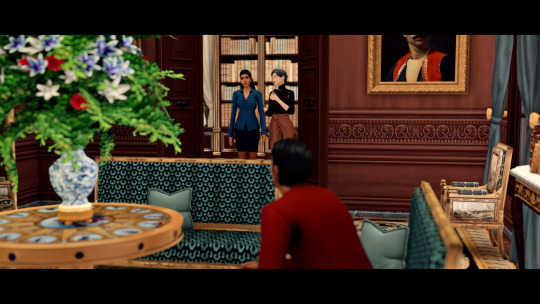
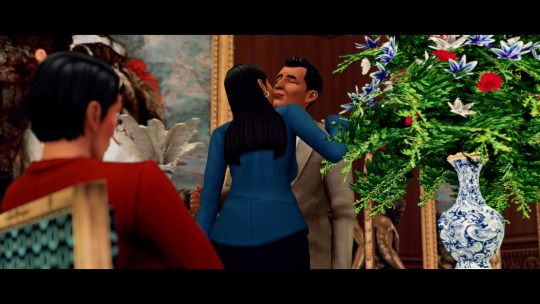

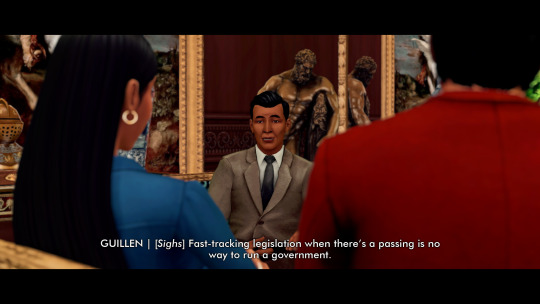
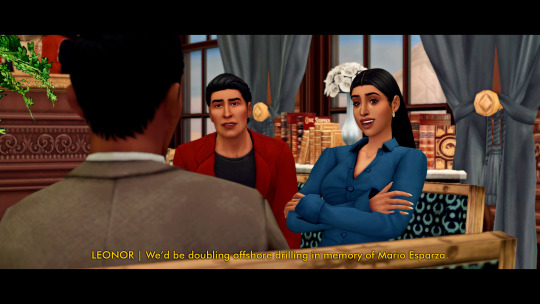

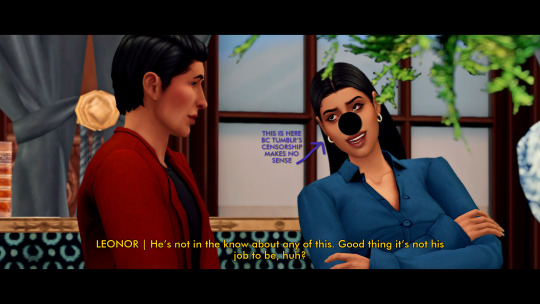
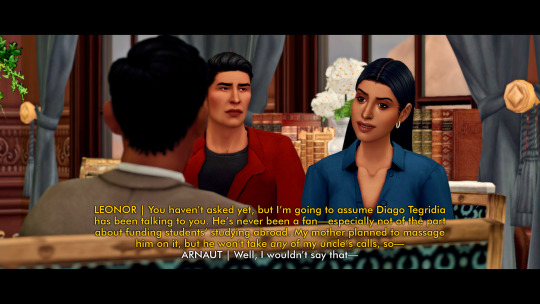
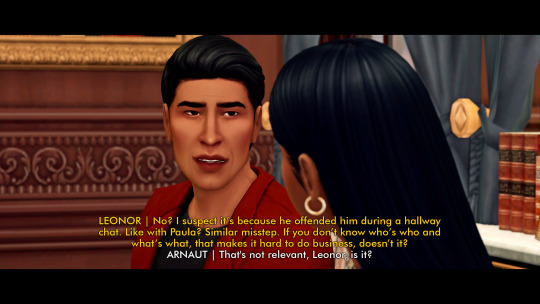
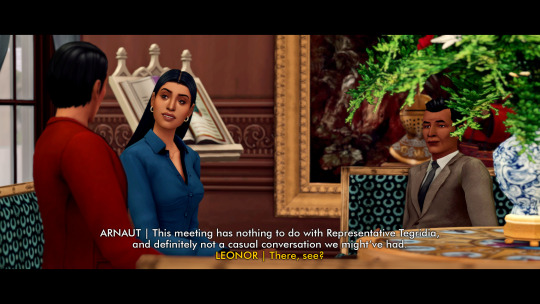
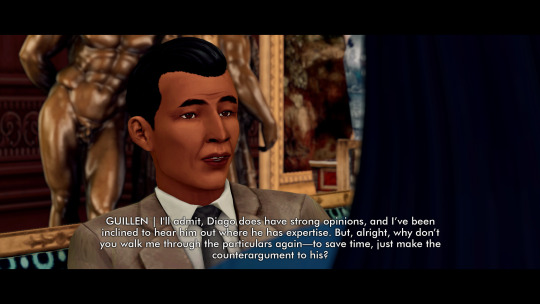
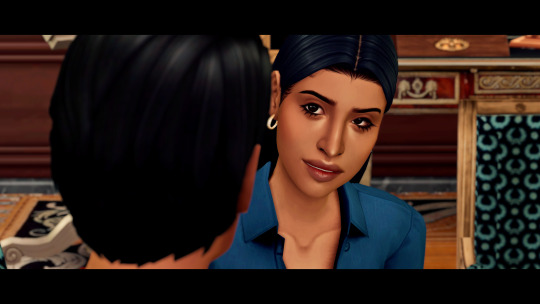
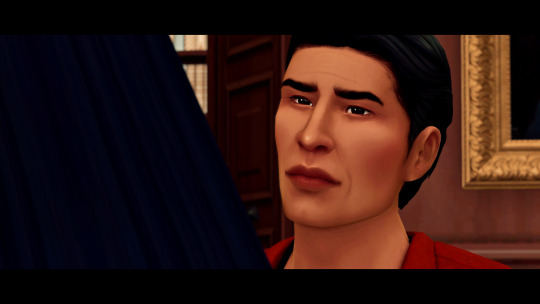


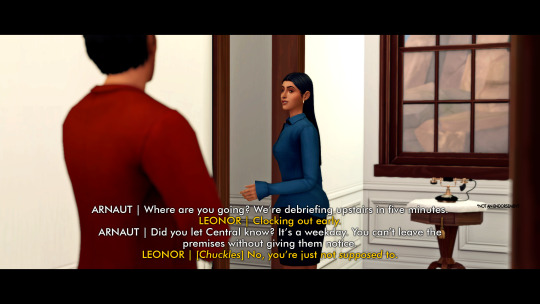

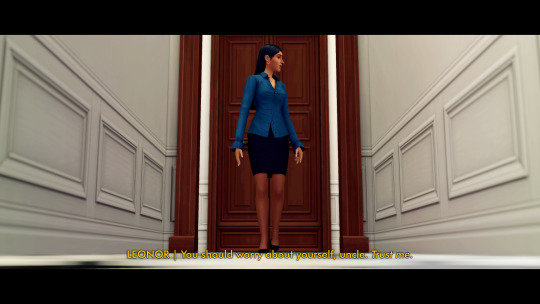
𝐍𝐎. 𝟓 ❛ 𝐡𝐨𝐭 𝐚𝐧𝐝 𝐟𝐚𝐬𝐭 ❜ | THE DEN & NAKAWE PALACE, AUGUST 1991
❧ 𝐝𝐢𝐫𝐞𝐜𝐭𝐨𝐫𝐲 / 𝐛𝐞𝐠𝐢𝐧𝐧𝐢𝐧𝐠 / 𝐩𝐫𝐞𝐯𝐢𝐨𝐮𝐬 / 𝐧𝐞𝐱𝐭.
❛ She’ll be here any minute.' Arnaut proffered yet another empty explanation to fill the silence. The premier granted forty-five minutes, but he had already spent fifteen giving intermittent assurances that Leonor was en route, delayed in some unpreventable way. Although known as gregarious and energetic, Premier Eladio Guillen sat across from Arnaut this entire time with a small, static smile. The anticipatory silence that dragged on seemed not to faze him. Waiting grated Arnaut’s nerves, meanwhile, as did attempting to puzzle out Guillen’s thoughts. Every minute of quiet that passed constituted some kind of failed test, he was certain. Yet, he exhausted his list of aide-approved topics within the first three minutes, and Guillen resisted his efforts to sidetrack the stillborn conversation into small talk. It could only be taken as a clear, loud message that the premier preferred to sit in total silence than humor Arnaut’s attempts.
❧ important psa: leonor is her grandmother's granddaughter; additionally, i did not proofread much and should've so sdjfsdf if you notice anything off, no you didn't !!!
𝐬𝐜𝐞𝐧𝐞 𝐜𝐨𝐧𝐭𝐢𝐧𝐮𝐞𝐝 & 𝐭𝐫𝐚𝐧𝐬𝐜𝐫𝐢𝐩𝐭 ↓
In fact, Leonor was due to be there any minute. She was in the parking garage of Nakawe Palace's complex, and she had arrived there just ten minutes past the appointed time. What kept her was the newspaper she’d snagged from a stand on Oceanside Avenue. It wasn’t a respectable publication, certainly not Nakawe’s paper of record, but its headline for the day caught her eye. That was rare. Even if tabloid chatter affected her subliminally, she wasn’t one to read the stories or pay much attention to the headlines. The newsstands she passed in the course of daily life were easy to ignore; someone delivered her preferred papers and magazines each morning, whether or not she planned to open them. This paper’s claim cut through the inane, sensational fabrications about her body, her love life, the silly woes with which some two-bit copywriter claimed to empathize.
It was almost certain that her having bought a copy of the day’s paper accusing her drug abuse would become tomorrow’s headline. At any rate, the shocked vendor stared. So too did other pedestrians as they passed. The speculation wrote itself. Why, after all, would she have bothered if there wasn’t something to it? Incensed, morbid curiosity wouldn’t do. There had to be a more salacious explanation; it was the one that argued her interest was somehow proof of guilt. But, the simple truth was that she had gasped at the sight of it: a grabby headline, juxtaposed photos innocuous on their own but damning in this contrived context, an authoritative quotation of concern from some anonymous acquaintance. The front page promised a full story unfurled inside, and Leonor, who had never been accused of wrongdoing in her life, became consumed with the need to know every lie printed within the pages.
As she sat in the car, reading about how her alter-self had become obsessed with benzos and tried heroin with a hard rock band, she knew there was no recourse. The Crown wouldn’t respond. These papers could publish whatever they liked, and they weighed that freedom against the constriction of access it only sometimes engendered. Leonor’s people had been silent and inflexible since winter—a moribund policy rolled over from before, when she was an off-limits teenager regarded as inseparable from the entity of her mother. Perhaps that was why she became fair game once the mourning moratorium lifted. More likely, the press’s the dark underbelly dwellers knew the larger apparatus of the royal family saw value in any public discourse about its members. Individual reputations were less of a concern, especially when the Crown itself and more reputable papers churned out flattering, factual stories to complicate any emerging narratives. For some time, gossip and relevance went hand-in-hand. Beatriz’s vision of the monarchy was increasingly a flirtatious one, winking when provocation paid off and demurring when it didn’t. Leonor had never needed to think too hard about it. Her mother went through the grinder time and time again, but her popularity remained intact, and she hadn’t ever let on, at least to her daughter, how terrible it felt.
It was within Leonor’s power to huddle her team and insist they at least pretend to respond. Her little household was hardly autonomous, but it didn’t need to be. Leonor complaining to her grandparents about rude tabloids would get her nowhere; a conversation among aides about public relations, on the other hand, at least created an official paper trail of bureaucratic value. Yet, that was why she found herself frustrated. This paper she held in her hands trumpeted glaring, clumsy lies. Those lies, however, didn’t need to be rooted in fact if they had been planted in a context that made them feel plausible. For the average Uspanian, the takeaway wasn’t in the details. Most people cast idle glances at the newsstands, noticing ugly candids and buzzwords, passively gleaning less of a coherent story and more of an ambient sense. Leonor’s new friends and hangouts weren’t the kind of blank slate she had been. They came with their own public associations, jumbled facts, wild fabrications. These particular details were false, and The Den remained a locked vault to the public, but it wasn’t outlandish to imagine her as part of the scene if ample photographs and videos suggested she was.
Leonor closed the paper and laid it on the passenger seat. It sat there, folded, for just a few seconds before she snatched it up again. Quickly, angrily, she tore at it. It wouldn’t rip down the middle, so she yanked out the pages instead. They shredded into scraps as she pulled wildly with haphazard, hurried fingers. Almost as fast as the impulse struck, it ran out of steam. Leonor stopped what she was doing and, feeling satisfied but far from content, tossed the mangled paper into the backseat.
When Leonor entered the premier’s sitting room, Arnaut watched with disbelief. She strolled in appearing unperturbed by her tardiness, and the apology she offered to Guillen as he rose to clasp her hands was simple at best. It didn’t bother him. His reception of her made his demeanor toward Arnaut earlier that afternoon seem lukewarm—unwelcoming, even. They interacted like people who were well-acquainted; Guillen’s famed charm leapt out as he kissed her cheek and made a joke about Nakawe’s drivers, and Leonor took up space in the room with ease.
Arnaut knew, in theory, he had received an upbringing not dissimilar from hers. They learned the same rules of comportment, and they learned the art of politics from the same teachers. In preparation for today, they had received the same briefs with identical preparation from the same team of aides. Yet, as Leonor settled into the sofa beside him and suggested with unimpeachable authority that they get to work, Arnaut felt the distance between them stretch to its true size. There was no substitute for experience, and there was no hiding its absence. Arnaut had been on the periphery of Uspanian public life for over a decade. Everyone remembered him as the immature, troublesome spare he had been. They viewed his life abroad as suspect. Worse, each day brought a litany of small reminders that no one much cared about who he was now or who he intended to become.
The television summarized it well just a few nights prior. These days, Arnaut watched news broadcasts as if it were a ritual, often doing so with a pen and pad that Lorraine politely ignored. USB’s evening news hour aired interviews with passersby on the streets of Nakawe as part of its programming. One elderly woman, prompted for an opinion on the crown prince, had furrowed her brow deep and hard. ‘Well, I think he is in for the most tragedy,’ she said finally. ‘People don’t change at forty. They just don’t. I lived long enough to know. You grow up right into who you are. So, what Uspana needs, he isn’t.’
Arnaut had been so immediately agitated by despair that he leapt from the couch and began to pace, talking aloud of how easy it would be to identify the woman, to find out where she lived, to go there with a box of sweets and get on his knees and beg her to change her mind. ‘Let me prove it to you,’ he would plead, holding her frail hands. Perhaps he would cling to her feet and even pepper the crooked toes peeking from her sandals with supplicatory kisses. ‘Give me a few good years to show you that I’m different.’ That was how he would frame it, too. She was right that it was a fool’s errand to prove he could change. What he hoped—the hopes that were, almost daily, dashed to dust—was that someone different lurked under the surface, suffocated for too long but real enough to show his face if Arnaut somehow found a way.
That way was elusive, although Arnaut knew he would never find it if he capitulated so easily. Today’s meeting felt bungled already, but he pushed himself to see Leonor’s arrival as a reset, as a reinvigoration, rather than a performance of naturality that he could never possess. He struggled to believe in his heart that the ability to rule flowed through his veins as much as hers, but it was more compelling to remind himself that he had been trained for this, too. Had he been as serious about it as she had, that deceptive distance between them would be more of a trench than a canyon. What mattered now was exactly that: he was serious now and, if the unexplained absence meant anything, perhaps even more serious than she was.
As the conversation turned to business, Guillen let out a sigh. “Fast-tracking legislation when there’s a passing is no way to run a government,” he explained, his tone light and wry even as he regarded them both with an earnest look of condolence.
“We’d be doubling offshore drilling in memory of Mario Esparza,” Leonor quipped. The comment prompted a laugh from Guillen, who pointed at Leonor and nodded emphatically.
Arnaut, meanwhile, sat bemused and wearing a vacant smile. The name didn’t ring a bell. He knew enough about the politics to understand why the policy idea was ridiculous, but he wasn’t privy to the personal backstory that gave it flavor in this context. Arnaut had once believed the capital to be a slow-paced, change-resistant bastion of tradition. The monarchy was sometimes accused of being arrested by its reverence for the old ways, and the legislative assembly had its own superficial but no less real way of doing things. People were the backbone of that. Perhaps naively, Arnaut had expected to find the same names in circulation a decade later. He hadn’t accounted for the turnover, but he also hadn’t accounted for how poorly acquainted with those people—with them, with their place in politics, with their connections to others, with the culture that glued them all together—he had been. It was difficult to insert himself now, knowing he had passed up the opportunity to belong as intuitively to this world as everyone around him did.
Having noticed Arnaut’s expression, Guillen asked, “You remember Mario, right? You’ve met Paula?”
“His wife?” Arnaut, with the urgency of panic, responded.
Leonor snorted, and Guillen raised his brows before clarifying, “His daughter. She’s filling his seat until the provincial election is held, so I assumed—”
“Forgive my uncle,” Leonor said, casting a look his way. “He’s not in the know about any of this. Good thing it’s not his job to be, huh?”
It was clear Guillen wanted to chuckle, but he remained quiet with his lips quirked in a smile that Arnaut found somehow just as offensive. He looked away from the premier’s expression to regard Leonor with quizzical eyes.
Apparently not finished, Leonor added, “You haven’t asked yet, but I’m going to assume Diago Tegridia has been talking to you. He’s never been a fan—especially not of the part about funding students’ studying abroad. My mother planned to massage him on it, but he won’t take any of my uncle’s calls, so—”
Arnaut, growing nervous, laughed. “Well, I wouldn’t say that—”
“No? I suspect it’s because he offended him during a hallway chat,” Leonor said with a shrug. “Like with Paula? Similar misstep. If you don’t know who’s who and what’s what, that makes it hard to do business, doesn’t it?”
“That’s not relevant, Leonor, is it?” Arnaut asked. From the corner of his eye, he saw Guillen sitting with the same amused, forbearing smirk on his face. “This meeting has nothing to do with Representative Tegridia, and definitely not a casual conversation we might’ve had.”
With an eyeroll, Leonor laughed, “There, see?”
Guillen nodded and offered Arnaut what was, it seemed, his best attempt at a placating smile. “I’ll admit,” he began, looking from Arnaut to Leonor, “Diago does have strong opinions, and I’ve been inclined to hear him out where he has expertise. But, alright, why don’t you walk me through the particulars again—to save time, just make the counterargument to his?”
Leonor turned more fully to face Arnaut, her expression expectant. They stared at each other for a long moment while he assessed the challenging look in her eyes and what she wanted from him,. He remained all too aware that Guillen was staring and judging, too. More than a challenge, Arnaut saw mischief in her eyes. Leonor was unwilling to look away or say anything. The corners of her lips were curled—not altogether a smirk, perhaps something more predatory, as if she intended to bare her teeth instead of break into a smile. The more seconds passed, the more pleased she seemed.
He turned back to Guillen with a sigh, concluding, “… I’ll let Leonor take the lead.”
TRANSCRIPT:
RENZO | Have I see you in blue? In person. LEONOR | Maybe once?
RENZO | It looks good. Black is better. Brown. White, whew. LEONOR | It’s for work. Work! I’m going to be late. Poor uncle.
RENZO | He’ll be alright? LEONOR | He’s a big boy. RENZO | Stick around a little longer? LEONOR | Nice try.
ARNAUT | She’ll be here in a minute.
GUILLEN | [Sighs] Fast-tracking legislation when there’s a passing is no way to run a government.
LEONOR | We’d be doubling offshore drilling in memory of Mario Esparza.
GUILLEN | You remember Mario, right? You’ve met Paula? ARNAUT | … His wife? [Leonor snorts] GUILLEN | His daughter. She’s filling his seat until the provincial election is held, so I assumed—
LEONOR | He’s not in the know about any of this. Good thing it’s not his job to be, huh?
LEONOR | You haven’t asked yet, but I’m going to assume Diago Tegridia has been talking to you. He’s never been a fan—especially not of the part about funding students’ studying abroad. My mother planned to massage him on it, but he won’t take any of my uncle’s calls, so— ARNAUT | Well, I wouldn’t say that—
LEONOR | No? I suspect it’s because he offended him during a hallway chat. Like with Paula? Similar misstep. If you don’t know who’s who and what’s what, that makes it hard to do business, doesn’t it? ARNAUT | That's not relevant, Leonor, is it?
ARNAUT | This meeting has nothing to do with Representative Tegridia, and definitely not a casual conversation we might’ve had. LEONOR | There, see?
GUILLEN | I'll admit, Diago does have strong opinions, and I’ve been inclined to hear him out where he has expertise. But, alright, why don’t you walk me through the particulars again—to save time, just make the counterargument to his?
ARNAUT | … I’ll let Leonor take the lead.
ARNAUT | Where are you going? We’re debriefing upstairs in five minutes. LEONOR | Clocking out early. ARNAUT | Did you let Central know? It’s a weekday. You can’t leave the premises without giving them notice. LEONOR | [Chuckles] No, you’re just not supposed to.
ARNAUT | You don’t think anyone will notice the … slacking off? Talk? LEONOR | What, are you going to tattle on me? ARNAUT | I don't have to. I’m just saying it’s a bad look. Trust me.
LEONOR | You should worry about yourself, uncle. Trust me.
45 notes
·
View notes
Note
Love your blog and all your analysis!!
Many people didn't like S2 because Simon, according to them was just a tool to drive Wilhelm's story, a love interest only and didn't really have his own story. In particular, many are frustrated at the lack of narrative on the video's effect and Simon's subsequent trauma. Of course, everyone's allowed their opinions but seeing as you have experience in the world of writing and making tv magic, wanted to get your insight on this. Thanks, a S2 fan! 💜
Hi anon! Thanks for the question.
I’ve already written pretty extensively about Simon’s arc in season 2 and why I like it in this post. In short, I think he grows a lot in season 2, but his growth takes him towards emotional vulnerability and openness, which is not something we’re used to seeing in characters (especially not male ones).
I also don’t mind how they address Simon’s trauma in season 2. I’m going to approach this momentarily not as a writer, but as someone who has been in therapy for years. There are some traumas that have happened to me (like a serious car accident when I was a kid) that are very concrete, with a set beginning and end, and that began to affect me right away. (I had ptsd symptoms pretty immediately after that accident). But there are other traumas that feel like a series of small cuts instead of one big punch. It’s harder to decide where they begin and end, and their effects are more subtle. Sometimes it takes me years to even realize that they were traumatic and that they are still affecting me. (The medical trauma I’ve experienced as an adult over several years is like this). To me this is more what Simon is dealing with with the video. Once the video goes online, it’s not coming down. There’s no set end date, and Simon spends most of season 2 not even knowing who the perpetrator was. He’s in the kind of no-man’s land between the initial blow and coming to understand how the whole process has affected him. That being said, I do think we see some changes in him that reflect what he’s gone through. He seems to care a lot less about his academic classes than he did in season 1. He’s writing music in an attempt to process what he’s been through. And you could even see his attempt to have sex with Marcus as a trauma response. The last time he hooked up with someone his agency was taken from him. So it makes sense to me that he’s eager to have sex again but fully on his own terms, to partially erase that feeling of not being in control. I don’t know for sure if this will happen, but I wouldn’t be surprised if we see more traditional ptsd symptoms from Simon in season 3. If there’s some sort of legal action against August that would signify a sort of “end” of the video trauma, and would also probably be re-traumatizing in a lot of ways. I also think interacting directly with the royal family might stir up some things as well.
Ok, now I’m going to totally switch gears and approach your question from a writing perspective. Let’s talk about story structure for a minute, specifically TV story structure. Most TV has an A plot and a B plot (and sometimes a C plot too). In old school cable procedurals, the A plot would be the mystery of the week, while the B plot would be about whatever was happening in the characters’ personal lives. If there was an overarching mystery or storyline that tied the whole season together, that would be the C plot. As you can guess by how they’re named, the A Plot would take up the most time and do the most to drive the episode forward. The B plot is next most important, etc. Once shows started to become more serialized in the age of streaming, the concept of A and B plots changed a little bit. Now the plots are divided by character and theme. The A plot will be headlined by the protagonist and will explore the main themes of the show. The B plot will be headlined by a secondary protagonist, who doesn’t have as much to do as the A plot lead, but is still answering a dramatic question that relates to the central themes of the show. A lot of times the primary and secondary protagonists’ actions influence each other, but they don’t share a ton of screen time. (If they did, their stories wouldn’t be separate.) You can think of the A and B plot protagonists as two sides of the same coin. They’re intricately connected, they’re exploring the same ideas, but they rarely come face to face, and they often represent different perspectives on the same themes. Black Sails is probably my favorite example of this. (I’m not as active in the Black Sails fandom as I am in the Young Royals fandom, but Black Sails is probably my all time favorite show and I absolutely love all the ungovernable pirates over in the Black Sails tag. Shout out to them). James Flint is the main protagonist and headliner of the A story, but Max is the secondary protagonist that headlines the B story. Both are struggling with the question of how to achieve and wield power in an unjust world, and their political maneuvers consistently influence each other’s plots. They share a lot of secondary characters across both of their plots, but they themselves never interact. So that’s one example, and if you look around at your favorite shows you’ll be able to find lots that adhere to this formula, including, I would say, Young Royals.
I think a lot of people are kind of subconsciously looking for this kind of structure, and have decided that Simon is the protagonist of the B plot. I understand this, because we all love Simon. He’s really well written and acted, his personality is so compelling, and his chemistry with Wilhelm is great. I spend a lot of time writing him in fic (I’m the writer of all the Simon content in Heart and Homeland) so I understand this impulse. But if you were looking for Simon to be anchoring the B plot in season 2, you might have been disappointed. Because in reality I don’t think he’s the secondary protagonist. I think Sara is.
Sara is set up as a foil to Wilhelm, the main protagonist, in so many ways. I always say that the driving dramatic question of Young Royals lives with Wilhelm, and it’s something along the lines of “should I conform and live the oppressive life that was designed for me, or rebel and find my own path to happiness?” Sara is wrestling with a similar question that’s kind of the inverse of this; for her settling into a prescribed role in the Hillerska class system initially seems like a relief. So maybe for her the dramatic question is something along the lines of “is the price of fitting in worth it? Will it lead to true happiness?” They feel so much like opposite sides of the same coin to me.
So Sara and Wilhelm are both trying to define themselves in relation to their families and also the class system. This comes up in the similarities of their family structure (they both feel very connected to their class position through their families; they both have complicated relationships with their mothers and bad to negligible relationships with their fathers; they both have a deep connection to their siblings) and in the relationships they choose to embark upon. They’re both navigating a very serious and complicated first love. They’re both dating across class (in the opposite direction, a perfect example of the “different views on the same theme” aspect of primary and secondary protagonists). They both have concerns about how and when their relationships become public, and by extension are both playing in the sandbox of themes around privacy and authenticity that define so much of the show.��
Both have difficulty regulating and recognizing their emotions. Sara seems to exhibit alexithymia, a common aspect of autism that makes it hard to recognize one's own emotions. Wilhelm has been taught to repress his emotions, which he does well until he explodes (like when he got into the fight at the top of the series or when he yells at his mom on the phone). He’s also managing a lot of physical symptoms of anxiety.
Both also struggle with questions of justice and how to make things right. In the beginning of season 2, Wilhelm is initially determined to destroy August because he thinks August will never repent, but by the end of the season he’s starting to realize that this was the wrong technique. He realizes this largely because of Simon; he only puts down the gun and walks away from August because Simon does first. Sara makes the opposite journey: she starts by trusting that August will change and repent on his own, but then she is forced to confront the fact that this is not true, and that she needs to use the legal system to bring August to justice. She makes this realization largely because of Simon, and seeing the ways that she has hurt Simon, in the same scene with the gun.
The other big argument in support of Sara as the secondary protagonist of the show is that she and Wilhelm never directly interact. Their actions affect each other all the time, but they don’t share a scene together. They’re living on parallel but separate story tracks.
Simon is a crucial character in both Wilhelm and Sara’s stories, but the fact that he is close with both excludes him from being a protagonist of his own plot line. (I would say the same about August, who is a catalyst for both Wilhelm and Sara.) That doesn’t mean that Simon isn’t well written. He has a very compelling character arc, motivates much of the plot, and his relationship with Wilhelm forms the heart of the show. But I think the reason people were disappointed in his story in season 2 is that they were expecting something from him that the structure of the show doesn’t support.
If you’re interested in reading more about A/B/C plot structures I found this website really easy to understand. Also shout out to @bluedalahorse for talking to me about Wilhelm and Sara and helping me articulate what I was trying to say here.
Thanks again for the ask, anon and for the vote of confidence in my analysis! I really appreciate it. If anyone else has a Young Royals scene or question they want me to break down from a writing or cinematography perspective, my ask box is always open.
#young royals#my meta#ask box#writing break down#simon eriksson#wilhelm young royals#sara eriksson#prince wilhelm
99 notes
·
View notes
Text
Don't ask me why I'm thinking about this, but like, I feel like the new (can we still call them that?) tomb raider games made a mistake by desexualizing Lara as thoroughly as they did.
Don't get me wrong, I'm a big fan of a lot of the changes made in an effort to make Lara feel like a rounded character with agency in the story - but also, Lara is a popculture icon specifically due to her sex appeal, and the complete omission makes it feel less like a reimagining of the character, and more like we have two completely different characters called Lara Croft.
There's a diary entry from Sam in TR2013, which mentions that while Lara is generally shy and not very social, she is an incredibly flirty and horny drunk - which to me suggests Lara has a desire for more sex, but is hampered by shame.
And like, wouldn't that have been an interesting aspect to include in Rise? A big part of TR2013, is Lara gaining confidence in herself and chosing her own path in life, so then in between games she decides "I've nearly died, a lot. If i wanna get dicked down a bunch, try bondage and experiment with bisexuality, who's gonna stop me?"
Which could then give Lara an interesting internal conflict if her sexual escapades played into the tabloid smear campaign against her - portraying her as that slutty party girl who believes zombies kidnapped her best friend, the callous headlines comparing her trauma on yamatai with Love Island basically write themselves.
if you wanted to get a bit counter cultural, you could even have Lara at the end decide to use the perception of her as a brainless bimbo to her advantage, the same way you sometimes saw old Lara slip into a hypersexual persona when she thought it could be useful.
Like i dunno, i feel like it would both make for a more interesting and complex character, and say something about the role of femininity (in society and in video games), to have a character who is essentially a genderbent rambo, but is perceived as a bimbo out of her depths.
17 notes
·
View notes
Text
The “Eggman is actually an adapted insult from Sonic!” thing that we are now proudly reminded of every 20 minutes makes me irrationally angry so I’m going to put an unnecessary amount of effort into explaining why it sucks.
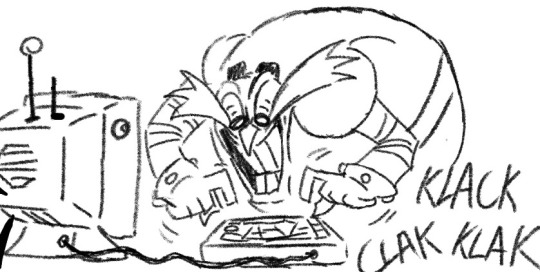
Supreme dumbass (although, perhaps not pointless) nerd rage below.
This seemingly innocuous thing is somehow emblematic of everything I do not like regarding how Sonic is currently handled. It:
- is one of the most blatant “Flynn-isms” (providing an explanation to something which does not need one entirely for the sake of winning brownie points with the fandom and “solving inconsistencies”)
- treats localized material like it is “equally as legitimate” as things which the actual creators of sonic made
- instead of taking the path of least resistance, the explanation is still convoluted and contradictory with other information, therefore meaning its purpose of “solving things” isn’t even fucking accomplished
- makes Eggman, the character, less interesting.
Let’s make a ground rule clear: his name is supposed to be Eggman. We could talk about the merits of “Robotnik” as a name as much as we like, but the fact of the matter is, whether you like it or not, his original, intended name is Eggman. And it works, because this character LOOKS like a fuckin Egg Man.

“Eggman” is a great name because it makes him seem silly and non-threatening, not in spite of it. Eggman is a character defined by contrast; he’s smart, but he’s also kind of absent-minded. He sometimes looks friendly, but he can also look scary and ugly under the right conditions because of his toothy grin and vibrant, perfectly circular glasses. He’s quite jolly and funny, but also capable of extreme anger and desperation.
He seems silly and harmless, but is capable of single-handedly destroying entire ecosystems and designing scarily effective hedgehog killing machines.
He’s trying to do things he think will “improve” the earth, but he ruins it in the process.
If you make Eggman purely evil and imposing, you miss the point of Eggman. These are traits Eggman has in common with actual strangely intelligent manchildren. I would know.
However, I would argue the single most key thing about “Eggman” as a name is it’s second half: man. Eggman is generally representative of humanity and it’s insatiable desire for “progress,” at the cost of everything in its way. And, you know, the “Egg” half is self explanatory.
So, personally, I would say that there is not much reason to try and legitimize “Robotnik” in the first place, beyond it sounding cool and having a pun in it. Eggman is not only more fitting, it is more meaningful.
This is all relevant, because this “adapted insult” shit is spawned exclusively from a desire to try and make the way it was for Americans in real life- Robotnik “changed” to Eggman- the case in THE ACTUAL IN-LORE CANON OF SONIC THE FUCKING BLUE CARTOON HEDGEHOG, for some god forsaken reason. This whole Robotnik thing is also the primary headliner for how the American versions of non-American stories are now given more priority, because they are the more well-known versions, which more or less only serves to retroactively simplify the actual themes Classic Sonic was going for. Why would you do this as a storyteller, unless you were irrationally trying to make everything “equally valid?” It’s supremely shitty to do this fandom-satisfying stuff when viewed from a lens of actual artistic integrity. (And it also makes trying to convince people that Classic Sonic has more going on than it looks a god damn nightmare because they live in this ouroboros-esque feedback loop of misinformation)
And you can’t argue that his name was Robotnik in-universe up until SA1, anyways, and that all of this “wasn’t actually in the games, so it doesn’t contradict anything if it’s retconned!” These things come up all the time in these debates already, and you’re probably bored to tears of hearing about them, but I’m going to use them anyways.

Lol.
You could argue that “oh, he just adapted the insult before Sonic 2!” to which I have to ask, what’s the god damn point, then? Congratulations. He is “Robotnik” for one, maybe two games. You’re not getting what you want out of this, either.
Well, now we have an interesting question on our hands. Why WOULD he call himself “Eggman?”
This is where things become more headcanon-y, but it’s all extrapolated from actual character quirks of Eggman’s.
“Adapted insult” is honestly fiiiine as another “he’s always trying to be one step ahead of Sonic!” thing, but the logic is really tortured and it’s far more interesting to explore “Eggman” as a conscious, self-chosen name.
Consider for a moment how egotistical and proud of himself Eggman is. He genuinely thinks he is the single most awesome specimen there is, he’s so proud of his intelligence and vision that he oftentimes forgets the most basic of logic, in a “you forgot the first rule of X!” sort of way.
Eggman is also a businessman. And all businessmen are obsessed with one thing above all else: marketing.
And so, I choose to interpret “Eggman” as him deliberately selling his image as a perfectly spherical weirdo with a big mustache. It could even be something like a “superhero name,” he’s so proud of it that he wants everyone to know it and respect it. He is the Eggman, that’s what he is, and don’t ask again.

If he came up with a catchy name for himself and started plastering it everywhere, every single person would eventually know who “The Eggman” is. And it’s not like Eggman is insecure about being fat, or whatever; again, he thinks he’s perfect. “Eggman” is a name he’s both proud of and is great for marketing.
Every logo of his also fits cleanly into this “plastering The Eggman everywhere” idea; they’re all either of the word “Egg” itself, or something to do with his appearance, most commonly just straight up his face.
Oh, yeah, and as alluded to earlier, his god damn theme song is about how proud he is about being “The Eggman.”
In summary, “His name was Robotnik, and then Sonic insulted him by calling him Eggman, so he just decided to roll with it” is a dumb explanation, made entirely to both-sides something that is actively worse for being both-sides’ed, and it is significantly better characterization-wise if Eggman just came up with the name himself.
Thus concludes this week’s edition of Pasta’s Dumb Nerd Soapbox, I hope I explained myself well.
27 notes
·
View notes
Note
is the BBC unbiased
The BBC strive to be impartial because that is their mandate, the problem is that nobody seems to agree what impartiality actually means, and true unbiased coverage of all issues would be wildly offensive to most people.
It is generally agreed that some topics, like the climate crisis, like racism, like sexism, don’t require dissenting voices. When it comes to more contested movements though, like trans rights and animal rights, the BBC will still hold views from both sides as if they’re worth the same. There is also the fact that the BBC, as a taxpayer funded organisation, can be unduly influenced by the government, which we’ve seen many times, such as the blatantly biased coverage they have Jeremy Corbyn and his policies. They sometimes just choose not to report on some things, particularly anti-establishment protests and politics, for obvious reasons.
We shouldn’t forget that the BBC itself is often the subject of headline news itself, and is then expected to report impartially on its own existence, which is absurd. It’s no less silly that they’re expected to report on the issues created out of thin air by the tories culture war distractions, as if they don’t know full well why the tories have chosen to make sure the media focus on that rather than the failure of our economy or their own instability.
The BBC writers themselves obviously have bias, and more than that, I think that the idea that there is any such thing as an unbiased viewpoint is a bit of a fantasy. I think they mostly do their best to remain impartial within the political constraints of their role, but it is naive to think of any news organisation as the unbiased arbiter of truth.
You can generally rely on the facts of any given BBC story being accurate, but you should account for any vested interest and recognise that there may well be wider context that they’re not reporting, there may be cherry picking of what information is ‘relevant’ and what is not, and there are often alternate views they are not airing. We should always be willing to look at more than one source and draw our own conclusions.
15 notes
·
View notes
Note
For the ask game, 9, 10, & 34 !!
from this ask game!
9 - Tell a story from your childhood.
I'll admit, this ask sat in my inbox because of this question. I've realized I remember mostly only snippets and themes and flashes from my childhood, and I think I've taken the word "story" too seriously in this context; the actual "stories" that remain are either that of horror, or teenage mischief (in which I am not about to be a bad influence on the internet heheh), some of which I would need help from my friends to recall in detail. I tried to maybe find my old photos of when I dressed up as Crona for Halloween when I was about 12 years old, but they must be on my old computer. (For the record, I don't remember that Halloween, I just know it happened. My two best friends dressed up as Medusa and Eruka.) My memories seem to be that of a zoetrope with a lot of the frames cut out; don't get me wrong, I spin them, still, all the same, but I must say it took me a whole month to think up of something to answer with...
Let's see, how do I start this story... I suppose I should preface that I was a bit of an anarchist in high school, in the ways that I could be. An example of which, with the help of some friends, we started two clubs, one of which was an under-the-table incognito after-hours ordeal that was meant for queer kids to have a space with like-peers--especially if their homes were unsupportive and unsafe--and the second was the art club. Now, an "art club" may seem pretty standard, but it was more or less based around a similar idea to the former ^^; But the reason I am describing all of this is because the art club--being comprised of a bunch of other-minded LGBT and ally kids--simply didn't want to (or couldn't, due to their idenities) go to prom. Sooo, instead, we organized a trip to Volcom (RIP), an art studio, an outdoor art museum, and--the headlining event--the graffiti park (also RIP). The graffiti park was just as it sounds: Tiered rows of walls where the public could just come by to make art. We all dressed up in thrifted formal wear (yknow, stuff we could get paint on, dresses and button ups) and played around with spray paint for the afternoon. I caught a glimpse of what makes Austin TX that day as a guy sat at the foot of the hill with a typewriter--you could pay or trade him anything to have him write you a poem (I didn't get a poem from him, but I did get one from an artist last year ^^), and... A guy and his friends who spotted my buttons. He asked if I wanted to trade pins with him. Being a kid, I cautiously declined, but he departed with words I still hold very close to me to this day:
"Peace, love, and anarchy."
10. Would you say you're an emotional person?
This is a fascinating question because I have no idea how to answer it. When you initially sent this, I paced around about it until I got tired. I feel inclined to say "Yes, undeniably," and simultaneously "absolutely not." I'm mentioned before that I'm schizoaffective--one part schizophrenic, one part bipolar--but, I'll admit, the latter has hard for me to get my head wrapped around and conceptualize, I've only very recently have been able to observe and acknowledge when more intense emotions come and go, arrive and vanish without notice. But this is just the thing, right? Observation? I don't know how not to compartmentalize my emotions, so while I might feel something intensely, I sincerely don't know how to express it in a way that's adequate (or "appropriate"), so oftentimes I just don't. Or I get ahead of myself and know I am going to feel completely different--and very starkly so--so my subconscious tries to constantly find a middle ground to rectify future confusion for anyone else involved, or to mitigate the damage of whiplash. How do I explain this? It's hard to excite me, but very easy to interest me, and I often worry that discourages folks sometimes because I tend to have a flat affect about things. "Mania vs happiness" is a very new concept I've been trying to untangle and decode within myself, too. For whatever it's worth, the only emotion I have a firm grasp on is rage--nothing makes me more level-headed and laser-focused than pristine anger, hahaha, and, really, I don't know why. Am I emotional? I don't know. I guess on paper, at least, I am. I come upon social situations and obstacles and I can't help but break them all down to fact and observation. A sort of disorganized tidbit here, but, too, if anything, I struggle to name the emotions I do feel; when people ask how I am, I don't know how to answer other than describing whatever activity I'm doing or project I'm neck-deep in. With both constant compartmentalization and a broken affect (either generally flat or I can't stop grinning about nothing), it's hard for me to pin it down. Perhaps I should ask for an outside perspective... I hope this starts to answer your question.
34. Any pet peeves?
I could ramble on about how much I can't stand small talk from strangers or when my colleagues use work-specific lingo in trying to communicate with patrons, but I've got one better: It blows my mind (/neg) when people seemingly don't have a shred of curiosity about anything. Nothing? Really? NOTHING is fascinating? Okay, yeah, maybe plants are boring to the next guy and maybe they don't care about how the cogs in a machine work, but when I drop a foreign word at work or a patron comes in with a wacky hat or we watch birds court on the sidewalk or we hear a questionable factoid on the news and nothing makes you go, at the very least, "huh..." ??? Rocks my world in a bad way. And I'm not talking about someone with low energy or someone who has a hard time focusing to absorb these kinds of things, I'm talking about "Hey, do you ever wonder--" "No." WHAT. Nothing at all? And curiosity doesn't have to be factual, "why does the moon revolve around the earth?" it doesn't have to be social, "What's your favoruite color?" Curiosity can be dragging a pen across paper just to watch a line appear; so when someone has absolutely no fascination? Maybe it's just something I don't understand. Tell me, AITA? Curiosity is the only thing that keeps me sane, I swear by it.
Thank you so much for the asks and for your patience. ^^
5 notes
·
View notes
Note
I just think it’s sad that Pete’s clean now, he’s married and had a baby and completely changed his live and now this gets brought up again. I just hope this won’t be another trial by media. I feel sorry for marks mum aswell but I just wish they wouldn’t use Pete’s name in any headline x
Hello, yeah it’s a shame he keeps being dragged into it, but his name is the only way to keep the media interested in the story and therefore to pressure the police, and I imagine that’s why the parents do it. They also seem to believe he knows what really happened, but even if that were true I’m not sure what he could achieve with a statement that multiple police investigations haven’t - even when they had a confession from the bodyguard. This isn’t going to be a massive story in my opinion. The first round already dropped off the front pages in less than a day because it’s an old story that’s been told dozens of times and already been the subject of a documentary. Unless someone directly implicated him in this new coverage I can’t see it being of interest to the media for more than a few days. As a side note - and not a criticism of you as I’m not saying you meant it this way - but I’m very wary of the term “trial by media” as it tends to be a right wing dog whistle that protects terrible people from being rightly exposed. Of course the media has been historically dreadful to people for clicks - Peter is a fine example - but the concept that exposing a person publicly is inherently the wrong thing to do isn’t always the case. There’s a lot of famous examples (Weinstein, for one) where the media brought evil people to justice through excellent investigative journalism. It’s not always the case, but sometimes what we call a trial by media is warranted. X
11 notes
·
View notes
Note
lol yeah new characters nowadays always have some kind of hidden secret or agenda, it's unrealistic and the show is so focused on angst, to the point where they forget about the friendships and some of the more light-hearted, natural moments. whereas back in like 2009/2010, there was angst but it wasn't overdone, and the community feel was still there. not every character was out for revenge or hiding some major secret lol. i agree that the arrival of the bartons was really refreshing compared to new characters these days.
If the Bartons arrived today all five of them would have different convoluted connections to different characters. Two would be out for revenge and three would have some deep dark traumatic secret backstory. Every viewer would be immediately suspicious of them and watching their every move and saying how everything they do is a red flag and then every reveal would make us reevaluate everything about them but also probably be a let down.
It's so exhausting. Haha.
I know soap as a genre is dying but the desperate need to keep doing bigger and bigger stunts and reveals and more unique issue stories just so they can get themselves in the headlines just kind of strips the show of its heart and soul and makes it ultimately less enjoyable to watch long term. Like sure, you might tune in for that specific big reveal the headline is telling you about or a specific issue story if it's of interest to you or the latest big stunt but if there's nothing to keep you there afterwards, then they've just lost them again.
Like sure I started watching, first for Aaron's coming out story and then later for robron but what kept me watching even after Robert left was because I had gotten attached to the whole show and the characters in it, even though it was already bad. And I knew it was too. I've read my old posts where I was upset that Ryan was leaving because I'd gotten attached to the show as a whole but without Robert and Robron, I wasn't sure I'd have anything to keep me watching because it had gotten so bad and it's only gotten worse from there. And I mean, I still have some attachment to it because of the older eras that I've seen but it's so bad now I only half watch it sometimes and more just to see what nonsense they're going to come up with next, not because I'm actively engaged and invested.
The other problem with always trying to one up themselves is that I'm not sure they could even go back to a 2010 style of storytelling. Ot it would be a rough transition anyway. Even though it was far better, people's expectations have been set and now they'd probably think they were bored if there wasn't some big reveal every other week.
We're so trained with new characters to immediately see them as having a secret agenda, we can't watch it without waiting for it. I mean, back to Marcus, when he came in as Pierce's retconned in long lost son, everyone immediately thought he was going to be evil somehow. Every move he made, people were like "oh he's being controlling" and this is going to lead somewhere and then...it didn't. And people were disappointed. I mean if he had just been a regular electrician, it would have been better and maybe they could go back to how it used to be but I feel like people would still expect the worst.
I mean everyone thought Ben would be out for revenge against Aaron. Everyone is waiting for Tom King to be evil now.
They've just ruined the show so much, I think it would be very hard to recapture the heart it used to have but I would rather they try than continue down this soulless track of chasing headlines.
4 notes
·
View notes
Text
15-week Hindi learning review

Here's what I've been up to in the past months:
Reading (11 out of 15 weeks) In November when I did the vocabulary challenge, I read a crap load of blogs, articles and Wikipedia pages hoarding so many words that I'm still updating my Anki to this day. Prose-wise I'm making some but slow progress with Nirmala. It's interesting to read because I have no idea about the plot or the story, so I have to make an extra effort to try and make sense of it so I don't lose track of anything important. I've also eyed some news headlines on Twitter and read that one whole BBC article I linked here before.
Speaking (11 out of 15 weeks) I had three iTalki lessons and a WhatsApp call with a native speaker. That's probably less than optimal for efficient practice - but I've noticed that speaking and thinking in Hindi regularly on my own has paid off. I have completely random thoughts in Hindi now - like if I see a lizard on TV, my brain goes "ah yes, छिपकली" before I even begin to think of the context of what I'm viewing. Sometimes I really miss having a Hindi-speaking friend in my daily life, it would be so much fun to practice in everyday situations (and I've been wondering if ChatGPT speaks Hindi and if I could use that somehow as a practice tool - no I'm not avoiding human contact, what made you think that?).
Listening (10 out of 15 weeks) Okay, I'm really pleased about this one. All these ten weeks I've listened to something else than just music in Hindi - an audiobook, podcasts, and YouTube videos (on how to wear a dupatta and other important topics, like a 90-minute long press conference on the release of Pathaan). The music challenge in January was also a lot of fun - listening to music is still a great way of learning new words and having those precious 'aha!' moments when things just click in your brain.
Writing (10 out of 15 weeks) I'm still writing scripts - slowly, and textbook exercises etc. I feel it has become easier to compose text in Hindi. Like the sentence structure has started making sense and I don't make as many mistakes anymore. But definitely still need a lot more practice.
Watching (9 out of 15 weeks) I watched four Hindi films (two I hadn't seen before) during these weeks, and in total 6 episodes of two different series, plus three stand-up comedy shows which were more or less in Hinglish. I think I'm reaching a level where I could quite comfortably watch a scripted series or a film without subtitles and grasp at least the majority of the dialogue. Maybe I should try this next.
Grammar (6 out of 15 weeks) I blame my endless Anki-update project I've taken on since the November challenge - I just can't make myself study or revise grammar properly when there are hundreds of words waiting to be uploaded into cards and edited to include all the synonyms I've now encountered. Yea I can be rigid in my thinking that way. I've made good progress with it though so I assume I'd be back to my usual grammar etc. routine by the end of May.
6 notes
·
View notes
Text
JPY Steals the Show as USD Stumbles - Trader Insights How the Yen Became the Star Player: A Trader’s Insider Take The markets are abuzz, and for good reason—JPY has been flexing some serious muscle lately. If you’re wondering why, sit back with a cup of robusta (or whatever gives you a buzz), because I’m about to break down the latest moves in the Forex arena in a way that’ll make you chuckle, nod, and possibly even rethink a few strategies. The BoJ, Rate Hikes, and JPY's Victory Lap If JPY were a person, it’d be that overachieving student who’s always one step ahead of the game. This time around, the yen’s outperformance can be linked to traders positioning themselves for a potential Bank of Japan rate hike next month. After all, nothing spells market excitement quite like fiscal stimulus and rate hike speculation—they’re like the mystery sauce that makes everyone suddenly pay attention to the quiet kid (JPY) at the party. USD/JPY has dropped to a 151.23 trough, and the USD is left feeling, well, not quite so dominant. The DXY (that’s the Dollar Index for those new here) is taking a hit too, sliding further below 106.00, resting now at a 106.33 base. You’d think the holidays would mean some respite, but with Thanksgiving data adjustments, traders can expect a jam-packed docket ahead. EUR and GBP: The Sidekicks Making Their Moves Ah, the euro—forever the ambitious sidekick to the dollar—is seizing the opportunity, climbing as high as 1.0540. A little hawkish cheer from ECB’s Schnabel and the general dollar weakness has given EUR a bit of an extra bounce. Think of it as that extra shot of espresso in your morning coffee; it’s making everything a bit more zippy. Across the Channel, the British pound is more or less holding its ground, benefiting from the same USD downside action. The fundamentals out of the UK are light, but let’s face it, sometimes you don’t need big fireworks to get people to notice you—sometimes it’s enough just to show up while everyone else fumbles. NZD: The Overachieving Runner-Up Right behind JPY in the winner’s circle, we’ve got the New Zealand dollar. The RBNZ went ahead with a 50 basis point cut, which was pretty much expected. But here’s where it gets interesting—the NZD managed to shrug off some of the pessimism, probably because a chunk of the market had been betting on an even bigger 75 bps cut. Instead of drowning in gloom, the kiwi flew up, topping out at 0.59 against the USD. It’s kind of like realizing you didn’t fail that test after all—relief can be a powerful motivator. The Hidden Lessons for Traders Now, here’s where the real magic happens—you might be wondering what this all means for your trading game. If you’re the type who likes to position ahead of big moves, keep your eyes on the yen. Rate hikes tend to do funny things to currencies—especially when it involves Japan, where such a move would be quite the market shocker. Meanwhile, the NZD story is a great reminder that expectation versus reality plays a big part in the currency world. When the majority expects doom, even a slightly less doomy outcome can feel like a win. This is where contrarian perspectives can come in handy; sometimes the best trades are the ones that go against the grain. The dollar’s stumble today offers a nice little insight into how fundamentals and sentiment dance together. Sentiment can lead the way even before data drops—kind of like knowing the ending of a movie before watching the first scene. And the euro? Well, it’s showing that sometimes you just need a well-timed comment from a central banker to give you that push forward. So what’s the takeaway? Well, if you’re positioning yourself in these markets, don’t just watch the headlines—read between the lines, and maybe even flip them on their head. Look for what’s unsaid, the quiet whispers that precede major announcements. With JPY, EUR, GBP, and NZD all taking unique stances against a softer USD, the opportunity for those willing to think outside the box is massive. Oh, and if you’re ever feeling a little overwhelmed by the details, remember that it’s not about predicting every market move perfectly—it’s about positioning yourself to take advantage when the stars align. Or, as I like to say, when the Bank of Japan decides it’s time to shake things up a bit. Need to stay informed, keep learning, or join a community of like-minded traders? Check out our services at StarseedFX—we’ve got exclusive economic indicators, free resources, community insights, and even a smart trading tool to help you navigate the waves. —————– Image Credits: Cover image at the top is AI-generated Read the full article
0 notes
Text
The Enigma of Daynolin Reddy: Unveiling His Journey

Ever heard the name Daynolin Reddy and wondered, "Who is this intriguing figure?" Well, you’re not alone! Many people have come across this name and find themselves searching for more information. Whether you stumbled upon him on social media or during casual conversation, one thing is for sure – there’s a lot more to Daynolin than meets the eye! In this article, we’ll dive into the life of Daynolin Reddy, explore what makes him so interesting, and, of course, sprinkle in some idiomatic expressions, humor, and informal language to keep things light and engaging. Ready to take this ride? Let’s jump right in!
Who Exactly Is Daynolin Reddy?
The name Daynolin Reddy might not be as mainstream as, say, Beyoncé or Elon Musk, but that doesn’t mean he’s any less fascinating. In fact, sometimes it’s the lesser-known individuals who have the most interesting stories to tell!
A Mysterious Figure
From what’s publicly available, it’s clear that Daynolin Reddy is an individual who values privacy. You won’t find him splashed all over gossip websites or making headlines for any wild antics. Yet, those who know him speak of a man with depth, ambition, and a unique perspective on life. But what is it that makes him tick? Let’s dig deeper.
Career Highlights
So, what exactly does Daynolin Reddy do? While information about his professional background is somewhat elusive, it’s safe to say that Reddy has been involved in industries that require sharp thinking, creativity, and a level of innovation.
Innovative Thinker: Those close to Daynolin Reddy often describe him as a person who’s always ahead of the curve. Whether it’s technology, business, or social trends, he seems to have a knack for staying one step ahead.
Entrepreneurial Spirit: There’s no doubt that Daynolin Reddy embodies the entrepreneurial mindset. He’s been involved in various ventures that have given him both success and wisdom.
Passion Projects
But it’s not all about business. Daynolin is also known for his passion projects, particularly those that involve giving back to the community. In fact, you might be surprised to learn that he’s heavily involved in charitable efforts aimed at helping underprivileged youth.
Daynolin’s Philosophy on Life
Want to know what drives Daynolin Reddy? It’s not just success or money; it’s something much more profound. He’s the kind of guy who believes in living life with purpose and meaning. Let’s take a peek into some of his guiding principles.
“Live and Let Live”: Ever heard the phrase? It’s one of Daynolin Reddy’s mottos. He’s all about letting people be themselves, without judgment or unnecessary interference.
Chasing Passion: Another core belief of Reddy’s is the importance of following one’s passion. Whether it’s in business, art, or life in general, he strongly advocates for people to pursue what makes them happy.
What Makes Daynolin Reddy Stand Out?
What truly sets Daynolin Reddy apart from the crowd is his ability to stay authentic in a world where everyone is trying to be someone else. He’s not concerned with chasing trends or fitting into a mold. Instead, Reddy believes in being genuine, and that authenticity is something we can all learn from.
Authenticity Over Popularity
Isn’t it refreshing to hear about someone who isn’t caught up in the race for fame? In an age where everyone’s chasing likes and followers, Daynolin stays true to himself. And that, my friends, is a rare and admirable quality!
Lessons to Learn From Daynolin Reddy
Now, let’s hit pause for a second. We’ve talked about who Daynolin Reddy is, but what can we learn from him? Quite a lot, actually!
Be Authentic: One of the biggest takeaways from Reddy’s life is the importance of staying true to yourself. It’s easy to get lost in the noise of social media, but Daynolin shows us that authenticity is more valuable than any number of followers.
Give Back: No matter how busy life gets, there’s always room for helping others. Reddy’s charitable work reminds us of the importance of giving back to the community and making a positive impact.
Stay Curious: Another lesson from Reddy is to never stop learning. Whether it’s exploring new industries or keeping up with the latest tech, his curiosity has undoubtedly contributed to his success.
Daynolin’s Future Ventures
While much of Daynolin Reddy’s current endeavors remain under wraps, it’s safe to say that the future looks bright for him. Whether he’s working on the next big thing in tech or focusing on philanthropy, there’s no doubt that Reddy will continue making waves.
But what exactly is next for Daynolin? Only time will tell! One thing’s for sure – whatever it is, it’s bound to be exciting.
Conclusion
In a world full of noise and constant comparison, Daynolin Reddy is a breath of fresh air. His story reminds us that there’s beauty in staying true to ourselves, chasing our passions, and giving back to the community. While his journey may not be plastered across every news outlet, those who know him understand the impact he’s had.
0 notes
Text
How News Websites Are Revolutionizing Public Opinion

The digital age has fundamentally transformed the way information is disseminated and consumed, with news websites playing a pivotal role in shaping public opinion. These platforms have become the primary source of news for millions of people worldwide, offering instant access to a vast array of information. As traditional media outlets grapple with declining print circulation and viewership, news websites are redefining the dynamics of public discourse and opinion formation.
Instant Access and Real-Time Updates
One of the most significant ways news websites are revolutionizing public opinion is through the immediacy of information delivery. Unlike traditional print media, which is limited by publication schedules, news websites can provide real-time updates on breaking news. This instant access to information allows the public to stay informed about global events as they unfold, shaping opinions almost instantaneously.
The speed at which news is disseminated has both positive and negative implications. On the one hand, it empowers the public to be more engaged with current events. On the other hand, the rush to publish can sometimes lead to inaccuracies or incomplete reporting, potentially misleading the audience. The pressure to be first can also contribute to sensationalism, where headlines are crafted to attract clicks rather than provide nuanced analysis.
Diversification of Voices and Perspectives
News websites have democratized the production and distribution of news, giving voice to a broader range of perspectives. In contrast to traditional media, which is often dominated by large corporations or state entities, news websites include independent journalists, bloggers, and citizen reporters. This diversification has led to a more pluralistic media landscape, where multiple viewpoints are represented.
The availability of diverse perspectives allows readers to access a wide range of opinions on any given issue, fostering critical thinking and informed debate. However, this also means that readers are exposed to varying levels of credibility, making it essential for individuals to evaluate the reliability of their news sources critically. The sheer volume of information can also lead to "information overload," where the abundance of conflicting reports makes it difficult for people to form well-rounded opinions.
Personalization and Filter Bubbles
One of the defining features of modern news websites is their ability to personalize content for individual users. Algorithms analyze browsing history, social media activity, and reading habits to curate news feeds tailored to the interests of each user. While this personalization can enhance user engagement, it also raises concerns about the creation of filter bubbles.
Filter bubbles occur when algorithms prioritize content that aligns with a user's existing beliefs and preferences, effectively isolating them from opposing viewpoints. This phenomenon can reinforce biases and polarize public opinion, as individuals are less likely to encounter information that challenges their perspectives. The echo chamber effect, where users are repeatedly exposed to similar viewpoints, can stifle meaningful dialogue and compromise the quality of public discourse.
The Role of Social Media Integration
The integration of social media with news websites has amplified their influence on public opinion. Social media platforms such as Facebook, Twitter, and Instagram serve as conduits for news content, allowing stories to spread rapidly across the globe. The viral nature of social media can propel certain stories to prominence, even if they originate from relatively obscure sources.
Social media's role in news dissemination has also given rise to user-generated content, where ordinary individuals contribute to news reporting through posts, videos, and comments. This participatory aspect of news consumption can democratize public discourse, but it also opens the door to the spread of misinformation. The challenge for news websites is to balance the benefits of social media integration with the need for accuracy and credibility.
Shaping Public Opinion Through Commentary and Analysis
Beyond the immediate reporting of events, news websites like Global News Insights play a crucial role in shaping public opinion through commentary and analysis. Opinion pieces, editorials, and expert analysis provide context and interpretation, helping readers understand the significance of news events. These elements are particularly influential in guiding public attitudes toward complex issues such as politics, economics, and social justice.
However, the line between news and opinion can sometimes blur, especially on websites that prioritize sensational or provocative content. The rise of opinion-driven journalism, where commentary is presented alongside factual reporting, can influence public opinion in ways that are not always transparent. Readers may struggle to distinguish between objective reporting and subjective analysis, which can impact their perception of issues.
Conclusion
News websites have become powerful tools in the formation and transformation of public opinion. Their ability to provide instant updates, diversify perspectives, and personalize content has fundamentally changed the way people engage with news. While these platforms offer numerous benefits, they also present challenges related to credibility, filter bubbles, and the spread of misinformation.
As news websites continue to evolve, their impact on public opinion will likely grow even more profound. It is crucial for readers to approach news consumption with a critical eye, recognizing the potential biases and limitations of these platforms. By doing so, the public can harness the power of news websites to stay informed and engage in thoughtful, informed discourse on the issues that matter most.
1 note
·
View note
Note
hii hii im way to new at interacting with blogs i follow to take off anon but anyways…
i really want to branch out and start writing again, it was something i used to do frequently but like got made fun of yk how it goes.
do you have any tips for writing ? i really enjoyed reading the kidult story which made me want to ask you for advice on writing anything helps ! 😵💫
hi anon! this is such an old ask that i've responded to in my drafts??? but never posted because it was too long, so now i decided i'll rewrite my response and post it this time!
i hate to hear that you've been made fun of wtf 😭 i will FOREVER throw fists at those people
although i doubt you may see this after Years, i think others may benefit from this!
ADVICE ON WRITING:
something i always recommend is rewrite, not revise! your final draft should look nothing like your first draft (in my opinion). when i write out my first draft, it's a mess—from writing only dialogue that comes to mind to reusing the same verbs over and over again—and that's perfect! then when you rewrite, that mess becomes more clear:
you notice more plot holes
the more you rewrite, the more the scene expands and you have a better idea of what's happening, from reactions to what's happening in the background
as much as its time consuming, i did it with every scene in kidult! in fact, for those who don't know me or my blog as well may not know this, but hyunjae's/myungho's mom was never meant to be the villain until i rewrote and thought more about every scene!
or for my headline fans, if you read the first chapter, it's kind of implied that haknyeon was supposed to be the second-love interest, but that changed drastically the more i wrote (cause how tf did i end up with qhak 😭)
for me and my writing, the story truly writes itself :]
another big tip is do NOT be afraid of scraping scenes! as much as it hurts, it can really put you in writer's block. maybe the scene you wanted to happen is not meant to be in your fic ^^ set the scene aside as an alternative and come up with another idea
my examples of this is with kidult's happy ending. my last scene that i have written made me stop, and i've dropped it ever since because i've been so busy and it became less of a priority. half a year later i realized i need to drop it and write something else, and that revived my motivation!
those are the big two that help me out a lot. my writing has definitely improved but not as much as it could have within the past two years because i've been focused on nearly everything else, so if you can, try and write daily! even if it's only 100 words. sometimes those ideas will resurface and you'll be thankful you already had an idea accumulating ^^
thank you for stopping by and asking this question! it means the world to know that there are people who admire(?) my writing, even if i myself can't see anything special :( if there's any other tips people want to give me, i would also greatly appreciate it! just like everyone else, i am always looking forward to improving as well
i think i also always had a fixation on numbers back then, from instagram views and followers to likes on tweets and then likes on tumblr posts, but right now i'm breaking that down because i know i will always have people supporting me, even if it's a close friend or family member, so never be shy with posting your works! if anyone also wants to recommend stories, whether it be someone else's or your own, absolutely send them my way!
i'm sorry this is so long, but i hope this helps anyone who needs it :] <3
0 notes
Text
While you make some great points I think you're overlooking some aspects of his character - I don't think either of these voice lines are a part of his facade, and are in fact both a result of it being broken.
X indeed likes to be, or be perceived to be, in control of a situation. You explained this really well and made some points that I didn't even think of before, so I won't touch on this.
X likes to project an image of a goofball, a silly fella, little guy. Someone who is aloof and careless. We can see this in his placing of newspaper clippings in a prominent places of his cabinet in his second story (Something for nothing 40%) - the second headline where he is called a "Foolish Genius" is placed just as prominently as the previous one praising him.
Neither of these responses to being hurt allow him to retain this image very effectively.
I think that he's surprised by being hurt and that breaks through his mask. The second voiceline is indeed probably a more controlled, less vulnerable response, but that doesn't mean it isn't also genuine.
We know that X is very calculating. He's a genius and likes to plan around situations, manipulating chance and other variables in his favour. In Laplace/the suitcase this means inventing new things (and getting praised for it), testing his machines on/with people, being helpful and having mischief/adventures with his friends.
We also know that he can also have pretty violent tendencies and that he killed someone whilst at the orphanage (presumably an abusive caretaker).
-
From the interview with UTTU in his story: Life Is Filled with Surprises (80% bond)
Pandora Wilson: Please introduce this exquisite mechanical ball you're holding.
X: It's just a toy I made for fun. Instead, I'd like to introduce this Auto-Seduction Lipstick I've just invented. Have a look! Is there anyone in the world better suited to test this out?
Pandora Wilson: That's alright. What an impressive invention.
Pandora Wilson: Let's talk about something else. There was an accident at an orphanage a few years ago and I heard you were present.
X: Oh? If you want to discuss topics that have nothing to do with the interview, you have to test this Bubble Gum Spraying Alarm Clock in exchange, okay?
Pandora Wilson: The deceased appeared to have been killed by a loose shingle from the roof. The angle, wind speed and power it had was incredibly precise.
X: Oh, such is life. It's filled with coincidences and accidents.
X: Don't be sad. Now, let's try this Mini Priest Bouncer and pray for him, shall we?
Pandora Wilson: Please excuse me.
X: ~♪~
Pandora Wilson: Ouch! Don't pull me!
X: ~♪~
Pandora Wilson: ...♪
-
He refers to any casualties in battle as an accident in voicelines and claims that there are no such thing in others.
He's also been stated to be a hitman by a Twitter post from the developers, but whether this is outright stating that he worked as an assassin or just a translation issue or metaphor, I don't know (It is also in several places of the wiki, but I'm not too sure on the sources for these).
His Green Lake garment described him as being the perfect killer and that all the cases go unsolved (though how cannon this and the other garments are I'm not sure, so take it with a pinch of salt).
Fortunately this is supported by his Portray/Artifice description: Sometimes, he has to shed some blood for the sake of others. Fortunately, he has machines to do that for him.
He doesn't want people to know about this violent part of himself.
I also think his use of the seduction lipstick is very interesting as it's his response to Pandora's persistence in her line of questioning when redirection fails. (Also did he just grab her and kiss her??)
Anyway I think the idea of identity, morality and choice are very central to X's character - can any actions be considered fake if you are still choosing to act in that way?
From an item description for the Green Lake garment:
A broken white mask that likely came from a corner store having a Halloween sale. The respondent raised a question with a smile: "Does the mask need the face that wears it, or does the face need the meaning the mask gives it?"
Very very disorganized X thoughts
Based on mostly voicelines
His incoming lines make me think a lot, honestly
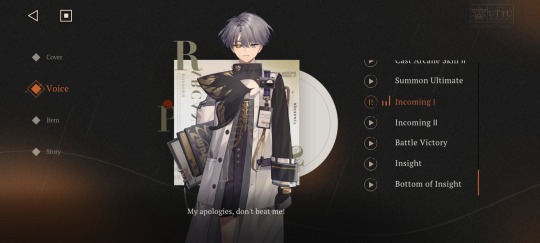
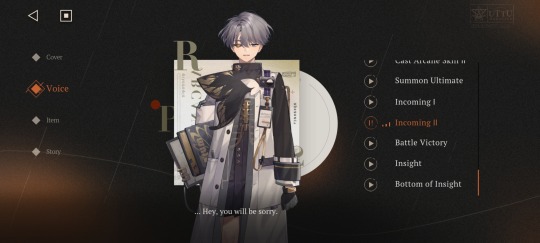
X is a liar, as it's stated several times in-game. He hides in his Goldberg machines and creates his own reality for fun, and quite possibly to feel safe from the external world. All of his confidence shows in times where he knows he has the full control of the situation ("Haha... I got you! I won't let you go, unless you agree to join my experiment!"). He likes to push people into his own world, but he's also dependent on them; he needs people to show them his machines, no matter how much he tries to satisfy his own desires with his creations, if there's nobody to test them on or show them to, what's the point?
"Try my new inventions... Ah! I had never prepared for a plan B in your absence..."
"Can I borrow you tonight? I really need your help for my new machine... please?"
"It's so nice to meet you! I've been waiting for so long!"
So, despite the confident and self sufficient facade he likes to put on, X is constantly referencing and asking for the attention of those around him ("Please live up to my expectations, colleagues!" "Ah, I seem to have grown a bit taller recently. Can you tell?"). If he ever takes an "imposing" role, it's when he's 100% sure he has enough power to enforce it, and he does want to have that power and confidence permanently and don't depend on other people and the external world anymore ("The day I've waited for has finally come. Welcome to my world."; Bottom of Insight line).
He reaffirms everyone likes him although of his eyes, something that caused a lot of rejection from people his age ("My eyes.. a little scary, aren't they? Kids new to the orphanage were a little afraid of them, but in the end everyone likes me."), and possibly the adults in charge of them themselves. He's dealt with a lot of rejection and mistreatment since he was a kid, and he looks for validation constantly, hiding under fake confidence and acting rebellious and chaotic on purpose to reaffirm said facade. He references his orphanage quite often in his voicelines, only when he's talking to Vertin, a friend he presumably can trust.
Going back to his Incoming voicelines, the first one really sticks out. They're both completely different reactions to the same threat, and one if them is most likely an act. My point is: considering X's facade mostly consists on appearing capable of anything, in control and smarter and more powerful than other people I don't know why he'd pretend to be scared.
Given how he talks about the orphanage, being a place where kids weren't even fed enough, didn't have winter clothes, weren't even allowed to exit the building, how much he liked to cause trouble, even trying to scape once, and how orphanages were in that period of time, it's highly possible kids faced physical violence from the adults in charge of them. Imo, the first line is genuine. He's recognized a threat, he knows he lacks enough power to face it, and he's scared of getting hurt. The second one is just another attempt at looking like he's in control of the situation. As I've said before, these lines are specially interesting to me because he is in battle, where he isn't in perfect control of everything, that's not his world completely and he can't drag people into it like he does at Laplace, so it makes perfect sense that he drops the facade for a moment facing a real threat.
Maybe this was all really obvious but whatever. I like him a lot
123 notes
·
View notes